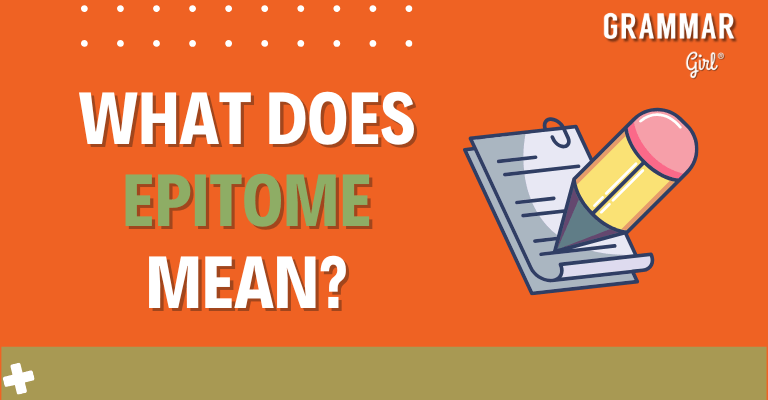“Epitome” is one of those words whose pronunciation can mess you up if you learned it from reading instead of from hearing people say it. The word is spelled E-P-I-T-O-M-E, and a lot of young readers end up thinking it’s pronounced “epi-tome” instead of “epi-tuh-mee” because a lot of the other words that start with E-P-I are pronounced that way: “epicenter,” “epidemic,” “epidermis,” and so on. And a lot of these people don’t realize their mistake until years and years later.
But I recently came across some interesting changes in meaning the word has been going through too.
What does ‘epitome’ actually mean?
First, “epitome” comes from Greek where as a noun, it meant “summary” or “an abridgment,” and as a verb, it meant “to cut short.”
And it first meant the same thing in English — “a summary.” For example, in a book describing some letters in 1698, the writer said, “It’s very difficult to give an Abstract or Epitomy of them.”
And here’s a funny quotation from William Sclater, a British clergyman in 1623: “This age is strangely in love with epitomes.”
It feels like he could have written that just last week about services that summarize books, like Blinkist or people who use ChatGPT to generate lots of summaries!
Now, I’ve never even heard this “summarizing” meaning. The meaning I know for “epitome” is “a representative or example of a class or type,” as in “Squiggly is the epitome of chocolate-loving snails” — but it seems like it wasn’t that long ago that the “summary” meaning started to fade.
How do language experts feel about the changing meaning of ‘epitome’?
The American Heritage Dictionary used to have a usage panel made up of language experts who would vote and comment on controversial usages. In 2004, they were asked to weigh in on the word “epitome,” and 20% of the panel still rejected this sentence: “Their business model is the epitome of efficiency.”
The suggestion in the write up is that this small percentage of panelists was sticking with the “summary” meaning being the only acceptable meaning. I was surprised when I saw that!
But even among the 80% of panelists who accepted other meanings, another 10% seemed to say that “epitome” should be used to describe only positive examples of a class and not negative examples. So 10% thought you can say someone is the epitome of a medal-winning gymnast, but not that the pet rock is the epitome of useless gifts.
Can ‘epitome’ mean ‘pinnacle’?
That last example is a little ambiguous and gets to another meaning that seems to be emerging for “epitome,” but that isn’t accepted yet today, and that’s the “pinnacle” meaning. Garner’s Modern English Usage calls that meaning a mistake.
If I mean that the pet rock is a good example of the class of useless gifts, then the way I wrote it works, and most people would be OK with that use even though it’s negative.
But if I mean that the pet rock marked the pinnacle of the age of useless gifts, and I changed the verb to write, “The pet rock WAS the epitome of useless gifts,” most people on the usage panel would say that use of “epitome” to mean “pinnacle” is wrong. But apparently you’re hearing it more and more out in the world these days.
What should you do?
Some interesting history there. “Epitome” used to mean “summary,” but that meaning is fading, and if you use it that way today, you may even confuse people. It’s fine to use ‘epitome’ today to describe something that typifies its class (a person or a thing), and it’s probably a little better to stick with using it in a positive way. Finally, for now, I’d avoid using it to mean “pinnacle.
Thanks to Paul from Joplin who pointed me to this “Epitome of Hyperbole” joke from Brian Regan:




